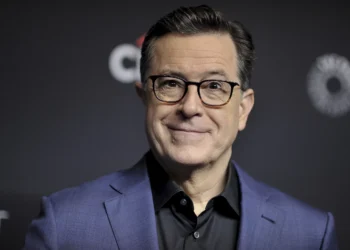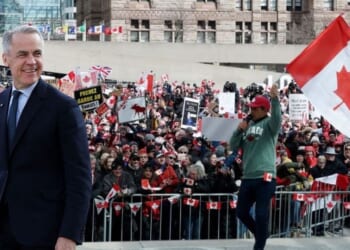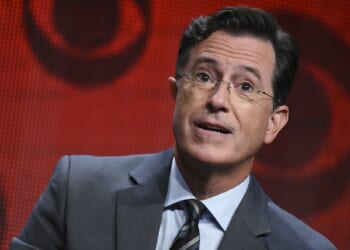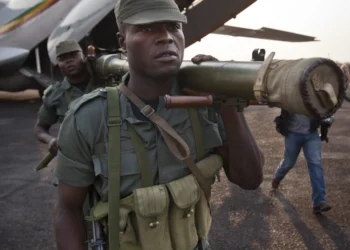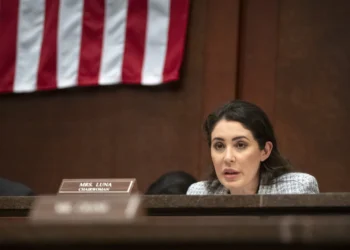The question from the BBC interviewer was short and to the point.
Considering how Vladimir Putin fed him a steady stream of bs about a possible peace deal with Ukraine, might President Donald Trump be ready to admit his “very good relationship” with the Russian president is ending?
“Are you done with him?” Gary O’Donoghue, the BBC’s chief North America correspondent, asked in a phone chat with Trump.
He added almost apologetically, “I know that sounds like a simplistic thing.”
Trump replied, “No, I’m not done, but I’m disappointed in him, but I’m not done with him. I thought we had a deal done four times, and then you go home, and you see he just attacked a nursing home or something in Kyiv.”
“Disappointed” has been Trump’s descriptor of choice to describe Putin’s “tapping him along” ever since his July 3 phone call with the Russian president, during which he admitted to reporters, “I didn’t make any progress with him today at all.”
“And I’m not happy about that,” Trump said, which is his other go-to phrase.
Trump’s been “unhappy” and “disappointed” with Putin for weeks, if not months, but he has spared Putin the kind of criticism he has angrily leveled in the past against Ukrainian President Volodymyr Zelensky, whom in frustration Trump has called “no angel” and “a dictator without elections.” This is all while blaming Zelensky for “allowing the war to happen” and being “very disrespectful” for having the temerity to ask for security guarantees before agreeing to a ceasefire.
Meanwhile, Putin, an indicted war criminal whose forces have abducted tens of thousands of Ukrainian children and attacked civilian targets with impunity, often gets a pass.
Such is the benefit of being on Trump’s nice list.
“I don’t want to say he’s an assassin, but he’s a tough guy,” Trump said during his meeting with NATO Secretary-General Mark Rutte at the White House. “He’s fooled a lot of people. He fooled Bush; he fooled a lot of people. He fooled Clinton, Bush, Obama, Biden. He didn’t fool me.”
As someone famously said (probably not Mark Twain), “It’s easier to fool people than to convince them that they have been fooled.”
Trump is having a hard time quitting Putin despite his uncharacteristically candid assessment of him during a July 8 Cabinet session, in which he admitted, “We get a lot of bulls*** thrown at us by Putin, if you want to know the truth. He’s very nice all of the time, but it turns out to be meaningless.”
“He thinks Vladimir Putin is his friend … He wants to be friends with Putin, and he’s still hoping that friendship will come back,” said John Bolton, one of Trump’s national security advisers during his first term, who observed firsthand how Trump admires, even envies, powerful dictators.
“Trump likes Putin. He likes Xi Jinping and Kim Jong Un, the North Korean dictator. He said after their first meeting, they fell in love,” Bolton said on CNN.
“Just to be clear … That’s not how Putin sees him,” he added. “Putin, reflecting his KGB training, sees Trump as an easy mark.”
Former CIA Director and Defense Secretary Leon Panetta said, “For those of us in intelligence who have watched Putin for a long time, we know that Putin will be Putin, that he cannot be trusted. The President has challenged Putin to be able to resolve issues over 50 days. I think the 50 days will basically give Putin additional time to do what he does best, which is to attack and kill people in Ukraine.”
Trump’s desire to maintain his “very good relationship” with Putin has blinded him to Putin’s perfidy and his existential need to win the war at any cost, according to longtime Kremlin watchers.
And Trump, by treating negotiations as a transactional process akin to real estate deals, continues to underestimate Putin’s intention to expand his goals, while feigning interest in peace.
“For now, his generals are telling him that the war is trending in a positive direction for the Russians, that despite the colossal losses that Ukrainians were able to inflict on the Russian invaders in the war of attrition, the bigger party, the Russians, will have an advantage over Ukraine. And that probably Ukrainian self-defense effort will run its course by the beginning of this September or fall,” Alexander Gabuev, director of the Carnegie Russia Eurasia Center, told CNN’s Fareed Zakaria.
“Putin believes that he can have his way and he can push and pursue his war aims and arrive at peace on his conditions, which means subjugation of Ukraine,” Gabuev argued, which he says would leave Ukraine as a failed rump state, under the control of Putin and at the mercy of the Kremlin.
The Washington-based Institute for the Study of War, citing recent sourced reporting from Reuters, concluded, “Putin’s theory of victory continues to drive his unwillingness to compromise on his pre-war demand for Ukraine’s capitulation.”
Reuters, citing sources close to the Kremlin, said Putin is “unfazed” by Trump’s sanctions threat, plans to keep fighting until his conditions are fully met, and that “his territorial demands may widen as Russian forces advance.”
“Vladimir Putin cannot afford to lose this war. Vladimir Putin cannot afford to be embarrassed in this war,” argued Julie Roginsky, a Democratic strategist who grew up in the former Soviet Union. “Much like the czars before him and Mikhail Gorbachev, who pulled the Russians out of Afghanistan, he understands that the collapse of his regime will be predicated on losing face in front of his people.”
While Trump has won bipartisan praise for no longer coddling Putin — Sen. Richard Blumenthal (D-CT) called it “a remarkable turn and a very positive step” and Sen. Chris Coons (D-DE) said it appeared Trump “is finally getting clarity that it is Putin who is the major barrier to peace, not Zelensky” — the reaction in Moscow has largely been mockery and derision.
“Trump issued a theatrical ultimatum to the Kremlin. The world shuddered, expecting the consequences. Belligerent Europe was disappointed. Russia didn’t care,” former Russian President Dimitry Medvedev posted on X.
Putin didn’t deign to respond, leaving it to lower-level minions to disparage the Trump threat of “100% secondary tariffs” after 50 days.
“If and when Putin deems it necessary, he will definitely comment on it,” Kremlin spokesman Dimitri Peskov said under the guise of needing more “time to analyze what was said.”
“One thing can be said unequivocally: it appears that such decisions being made in Washington, in NATO countries, and directly in Brussels, are being interpreted by the Ukrainian side not as a signal for peace, but as a signal to continue the war,” Peskov added.
Translation: If Ukraine has a green light to keep fighting, then so does Russia.
“We genuinely seek to comprehend what underlies this ’50-day’ declaration. Previously, there was discourse of ’24 hours,’ then ‘100 days,’” Russian Foreign Minister Sergey Lavrov said. “An unprecedented volume of sanctions has been levied against us. We are managing. I have no doubt we will prevail.”
Panetta said, “Russians have been pretty smart about their ability to avoid sanctions and get around sanctions, no matter what they are or how they’re fashioned. And I think that that will happen here as well.”
“The only way you deal with Putin is by force,” Panetta added. “And that means giving weapons to the Ukrainians that will give them the ability not only to defend themselves, but to be able to gain the initiative against Putin.”
But Trump has already undercut his other leverage, expressing a concern during his meeting with the NATO secretary-general that Ukraine “all of a sudden, may feel emboldened.”
“We want to make sure that Ukraine does what they have to do,” Trump said.
Rutte assured him, “Ukraine wants a peace deal.”
Trump responded, “They have to continue to want it, though.”
The next day, in apparent deference to his erstwhile pal Putin, Trump suggested Ukraine should pull its punches, and Zelensky should consider the Russian capital off limits.
“No, he shouldn’t target Moscow,” Trump told reporters. “No, we’re not looking to do that.”
In his first term, “President trusted Putin over his own intel community. He has never criticized him. And gloriously, he finally starts to question him,” Rep. Mike Quigley (D-IL), co-chairman of the Congressional Ukraine Caucus, said on CNN. “I’d love to hear him say for the first time that Ukraine needs to win this war. And it’s because it’s the right thing to do and it’s the right thing to do for our own safety.”
Bolton said, “I think it’s a mistake to conclude there’s some kind of shift in policy here. I don’t think that’s the way Trump does business. He sees international relations as the equivalent of the relations between heads of state. So, if he’s friends with Vladimir Putin, he thinks the U.S. has a good relationship with Russia.”
“He’s just irritated with Putin that he stood him up basically. So, he said, ‘All right, fine, just to show that, I’ll authorize air defense systems,’” Bolton added. “That’s what he said on Monday. On Tuesday, he said he didn’t want to deliver offensive weapons. Who knows what he’ll say tomorrow?
THE BATTLE OVER COLORADO’S SPACE COMMAND ISN’T OVER, BUT IT MAY BE ENDING SOON
Trump’s standard answer, “We’re going to see what happens with President Putin. So far, I’ve been very disappointed.”
Or as Neil Sedaka crooned, “Breaking up is hard to do.”


